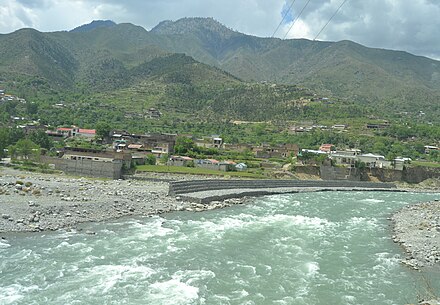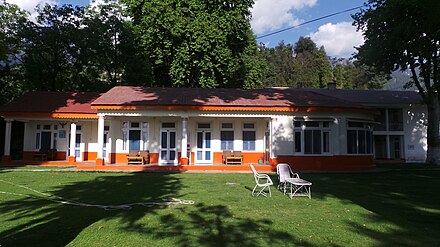Khyber Pakhtunkhwa - Province of Pakistan
Khyber Pakhtunkhwa is an exceptionally dangerous area. Militant groups routinely conduct attacks, and assassination and kidnapping attempts are common.
Consular assistance is severely limited, and the lack of infrastructure, geographical constraints, and poor security situation make things even more challenging.
Those who decide to go should keep abreast of the latest security situation throughout their stay. See War zone safety and the "Stay safe" section below.
Although Khyber Pakhtunkhwa is claimed by both Afghanistan and Pakistan, it is under the effective control of the Pakistani government. As visitors wishing to visit have to obtain Pakistani visas, permits and so on, we treat it as a part of Pakistan here. This does not represent a political endorsement of the claims made by either side of the Durand Line dispute.

Khyber Pakhtunkhwa (abbreviated KP or KPK), borders the rest of Pakistan to the south and east, central Afghanistan to the west, and the Wakhan Corridor to the north.
The region has a varied landscape including rugged mountains, valleys, hills and dense agricultural farms. There are a number of Buddhist archaeological sites from the Gandhara civilisation such as Takht Bhai and Pushkalavati. There are a number of other Buddhist and Hindu archaeological sites including Bala Hisar Fort, Butkara Stupa, Kanishka stupa, Chakdara, Panjkora Valley and Sehri Bahlol.
The region has had other names. In the era of the British Raj, it was generally called the Northwest Frontier. After Pakistan's independence, much of it was known as the Federally Administered Tribal Areas, FATA. On maps, it was part of the Raj and is now part of Pakistan, but neither Britain nor Pakistan has ever fully controlled the area; the local Pashtun tribal chiefs remain very influential.
Regions
KPK is Pakistan's 3rd largest province, with an area of - comparable in size to the Republic of Ireland or to South Carolina in the United States. Population is about 35.5 million, roughly comparable to Canada, Poland or California.
It has 9 administrative divisions:
- Bannu Division
- Dera Ismail Khan Division
- Hazara Division
- Khyber Division
- Kohat Division
- Malakand Division
- Mardan Division
- Peshawar Division
- Waziristan Division
Cities
.jpg/440px-Saiful_Muluk_Lake_(Winters).jpg)
- Peshawar — the capital city of Khyber Pakhtunkhwa, the cultural centre of the region, and the focal point of Pashtun culture. It was the birthplace of the Taliban and is in the midst of an ideological struggle between moderates and extremists.
- Abbottabad — a military garrison city, is infamous as the place where Osama bin Laden had been hiding for much of the time following the US invasion of Afghanistan until his death during a raid on his compound by U.S. Navy SEALs.
- Charsadda — headquarters of Charsadda District, in the Valley of Peshawar. The ruins of Pushkalavati, the capital of the ancient Gandhara, are here.
- Dir — capital of the former princely state of Dir, until its abolition in 1969.
- Hangu —
- Mardan — the second-largest city of Khyber Pakhtunkhwa, located in the Valley of Peshawar.
- Mingora — the 3rd largest city in Khyber Pakhtunkhwa, once a major tourist destination.
- Naran — a popular tourist resort and an excellent trekking destination, in the Kaghan Valley.
- Shabqadar — home of Sharkargarh, a Sikh fortress
Other destinations
- Khyber Pass — Visit the legendary 1,067-m-high (3,501-ft) break in the sheer rock wall separating Afghanistan and Pakistan.
- Swat Valley – one of the most famous and rewarding visitor destinations with the gushing Swat and Ushu rivers, lovely waterfalls, snow covered peaks for skiing, together with some excellent tasting fruits and hospitable people (check current travel advisories first)
- Kalasha Valleys – witness the decline of a unique culture in Chitral District
- Ayubia National Park
- Kumrat Valley — one of[Pakistan's most beautiful valleys, it is covered with lush green pastures, the gushing river Panjkora, snow clad mountains, foggy mounds and forests. Kumrat is a good camping spot, and most campers bring their own tents and pitch them for lodging.
Understand
In the era of the British Raj, this region was known as the Northwest Frontier and the British called its Pashto-speaking people Pathans; today we would say Pushtuns. It was both a perennial trouble spot and the source of many fine recruits for the empire's forces; there were whole regiments of Pathan irregular cavalry. Today there are many Pushtuns in Pakistan's military.
For decades after Pakistan's independence in 1947, the region was divided into the Northwest Frontier Province and the Federally Administered Tribal Areas (FATA), then in 2018 they were merged into a single administrative unit, today's Khyber Pakhtunkhwa.
Khyber Pakhtunkhwa offers invitation to a spectacular landscape and cultural diversity. Peshawar is the business and administrative hub of the province though other cities have their places. Some of the tourist’s hotspots include Khyber pass, old interior city, industrial estate famous for smuggled goods, Islamia College, Peshawar fort, (KisaKhawani) story teller bazaar. Its food street is famous for barbecued mutton as well as karahi meat.
There are very amenable people in this area, especially in the mountains in Shandoor and Kalash regions.
Talk
Pashto is the main language of the region, and many people have it as a first language. It is also common in Afghanistan. Many people also speak one or both of Pakistan's Urdu or Afghanistan's other main language, Dari (a dialect of Persian). Many of the more educated people speak English.
Other languages spoken in the region include Hindko, Saraiki, Khowar and Kohistani.
Get in
Prior permission from the Pakistani government is required before non-Pakistanis can travel to Khyber Pakhtunkhwa given the poor security situation in the region. Such permission, known as a No Objection Certificate (NOC), must be obtained from the Pakistani Foreign Ministry. Failure to obtain an NOC and attempting to enter Khyber Pakhtunkhwa could result in arrest.
By plane
Peshawar International Airport (IATA: PEW) is in the center of Peshawar. It is served by all Pakistan carriers including national flag carrier PIA. Moreover, many Middle East airlines also serve this airport, such as Emirates, Etihad, Gulf, Kuwait and Qatar airlines.
Peshawar airport has international direct flights from Al Ain, Bahrain, Dubai, Abu Dhabi, Doha, Jeddah, Kabul, Muscat, Kuwait and Riyadh. The connections from other Asian, European and American cities are available via Lahore, Karachi and Islamabad airports. The domestic flights to/from Peshawar Airport are Chitral, Islamabad, Karachi and Lahore.
Chitral Airport (IATA: CJL) from Islamabad and Peshawar.
By bus
Buses and minibuses run from many parts of the country from here.
Daewoo (dead link: January 2023) operates the most luxurious services to Rawalpindi, Islamabad, Multan, Faisalabad, Abbottabad and Lahore (Rs 600, 6½ hours).
By car
Peshawar is connected with Islamabad via Motorway M-1 and via national highway N-5.
By train
You can reach Peshawar by train with Pak Rail from Karachi (36 hours) and Quetta (25 hours), both go via Lahore and Rawalpindi.
There are no passenger trains from Landi Kotal in the Khyber Pass.
Get around
See
- Ruins of Takht-i-Bahi in Mardan
- Ruins of Sahr-i-Bahlol
- Bala Hisar Fort in Peshawar
- Burj Hari Singh - Sikh fort founded by Sikh General Sardar Hari Singh Nalwa (no longer exists)
- Panch Tirath – An ancient Hindu site now converted into a park
- The Sikh Temple at Jogan Shah
- Gor Khuttree – An ancient site of Buddha's alms or begging bowl in Peshawar. Headquarter of Syed Ahmad Shaheed, Governor Avitabile
- Pakhtu Academy – The site of an ancient Buddhist University
- Shah Ji Ki Dheri
- Chowk Yadgar
- Ghanta Ghar – clock tower in Peshawar
- Avitabile's Pavilion
- Victoria Memorial Hall
Do
In the summertime hiking tours to the mountains are offered. Ask at Green Tours in front of the Greens Hotel, Peshawar Cantt, and Pearl Tours of the Pearl Continental Hotels. This can also be done by hiring a car, jeep or pickup from local car rental agencies.
The region is home to Pakistan's oldest ski resort near Malam Jabba, albeit modest in size with only 2 pistes.
Eat
- Chappal Kabab, a beef kebab shaped like the sole of a sandal is most famous dish of Peshawar. Several famous kabab selling shops are around. Information about them can be obtained from the travel agents or local hotels and guides.
- The restaurants in Namak Mandi serve marvellous tikka and karai. Meat is ordered by the kilogram, and then prepared according to your preference, either as tikka (barbecued) or as karai (an oil-rich stew with tomato and chili).
- Faluda, a sweet dish mainly found on the Peshawar markets and bazaars especially Qisa-Khwani Bazaar.
Drink
- Peshawar is known for its Kawa (Green Tea) which has a unique flavour, and is usually served sweet.
- Sharbat-e-Sandal is a sweet, non-carbonated drink unusually found in markets in summer. It has a good taste and a yellowish-green transparent colour - look out for the black seeds. Served ice cold.
Sleep
- Pearl Continental Hotel
Stay safe
Northwest Pakistan is an exceptionally dangerous area. The locals have a long history of tribal warfare and banditry, both of which still go on, and they have been fighting off various invaders since Alexander the Great. The main fighting today is the Taliban versus the Pakistani military, but there are other dangers as well: al-Qaeda, various tribal forces, and US drones.
Terror attacks and political assassinations are a common occurrence in the region. Between 2007 and 2012, there were a recorded 186 suicide attacks in Khyber Pakhtunkhwa, more than the total number of suicide attacks in all other areas of Pakistan. Before going to Khyber Pakhtunkhwa, Swat, and Peshawar, check for travel advisories from your government.
The towns bordering tribal areas are not considered particularly safe, and nor are the Afghan-Pakistan border regions, as the Pakistan government has little to no authority in these areas and cannot aid you in an emergency. You should always seek information about off-limits areas before travelling to this region. Prior permission from the Pakistani government is required before non-Pakistanis can travel to Khyber Pakhtunkhwa given the poor security situation in the region. Such permission, known as a No Objection Certificate (NOC), must be obtained from the Pakistani Foreign Ministry. Attempting to enter Khyber Pakhtunkhwa without an NOC could result in arrest.
